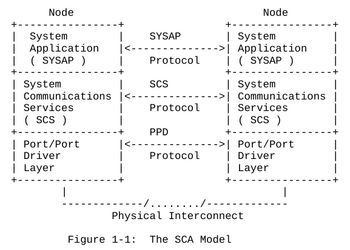System Communication Architecture
From Computer History Wiki
The System Communication Architecture (given as Systems Communication Architecture in some documents) is DEC's data networking architecture for VAXcluster systems; it defines the major constituent protocols, what functions each one performs, and how they interact. It allows the basic data-communication mechanism of a VAXcluster, the Computer Interconnect, to be shared between the numerous functions needed to operate the VAXcluster.
The System Communication Architecture has got a three-tier model consisting of the layers (from top to bottom):
- System Application (SYSAP), using the SYSAP Protocol
- System Communications Services (SCS), using the SCS Protocol
- Port/Port Driver Layer, using the PPD Protocol
SCA Services
The SCA architecture supports the performance of six different functions:
- Cluster configuration management
- Buffer management
- Connection management
- Directory services
- Datagram and sequenced- message services
- Named-buffer transfer services
See the article linked below for detailed descriptions of the SCA functions.
External links
- The System Communication Architecture, in DTJ, Vol. 1 No. 5, September, 1987 (pp. 24-30 of the PDF)
